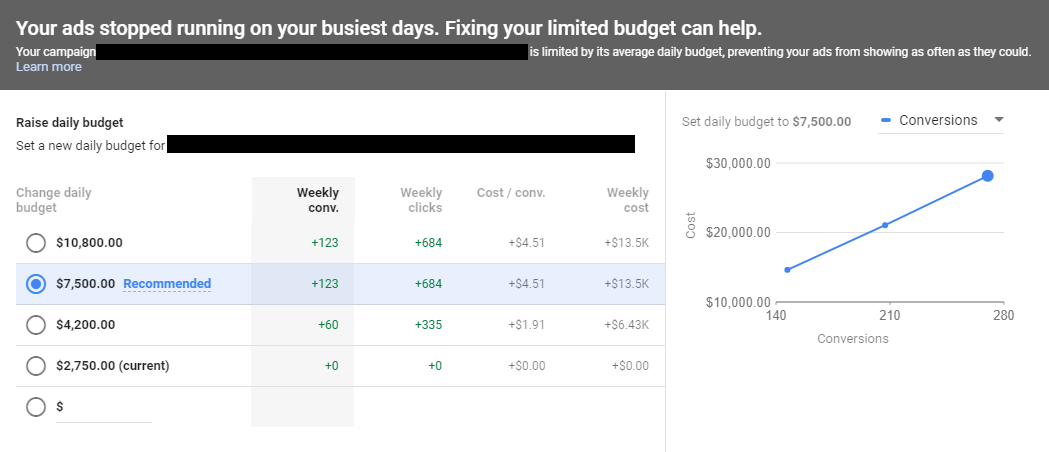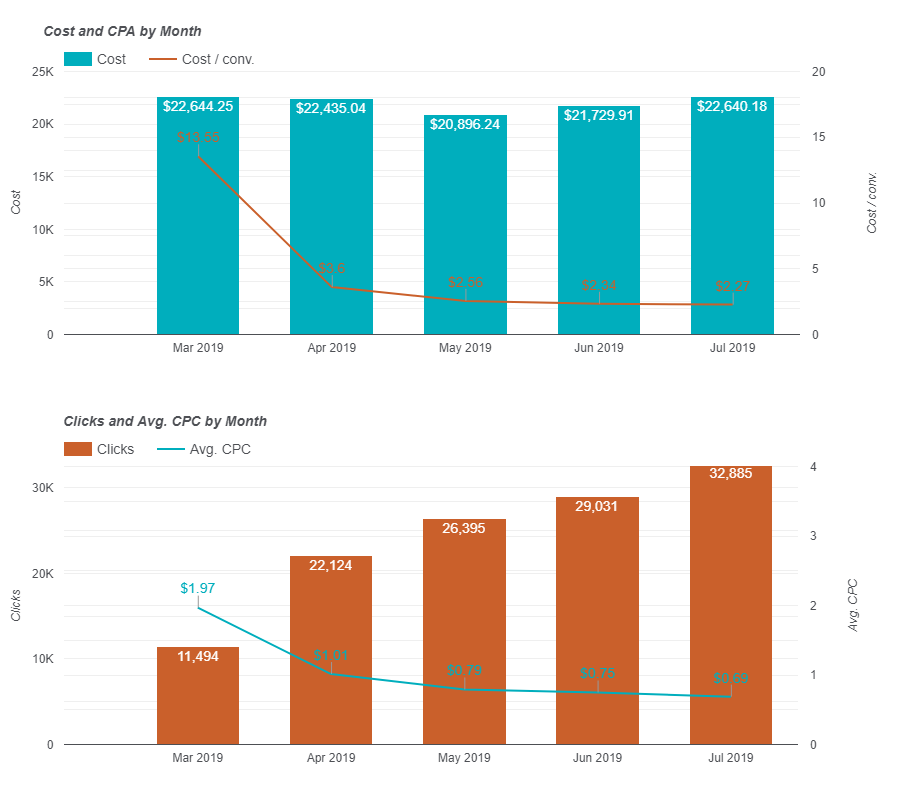
Your campaign is limited by budget—what does this mean?
We’ve all seen the alert before:
Some see it as a bad thing, some see it as an opportunity, and some just want that ugly red text to go away. When a campaign is limited by budget, here’s what’s happening:
- You’re missing out on traffic: Google is only able to enter you into a certain number of auctions based on your daily budget. If that budget is too low compared to your keywords’ search volume and average CPCs, your delivery will be limited, meaning fewer impressions and clicks.
- You’re missing out on conversions: If your campaign is budget capped, you’re leaving conversions on the table! If you’re missing out on impressions and clicks, you’re definitely missing out on conversions.
- You’re letting competitors get a leg up: If you’re not showing up for a search, your competitor probably is. Whenever you’re limited by budget and not entering into as many auctions, your Brand name isn’t showing on the SERP as often for relevant queries.
What can you do to fix it?
Raise your budget
The easiest way to fix this problem and get rid of the alert is by raising your budget. Google wants you to do this (more $ for them), so they make it pretty easy for you to see the impact of an extra $100 or $1,000 in spend.
In this example, Google is suggesting that we raise our daily budget to $7,500 to capture an additional 123 conversions per week at a comparable CPA. While these recommendations are usually pretty sound, it’s still good to check on performance and actual spend after making the change.
You can also calculate maximum potential spend manually if you’re looking for a more exact number. To do this, use a campaign’s Search IS Lost (Budget) to calculate total available impressions, then use CTR, CPC, and CVR/CPA to project potential spend and conversions if you increase spend. Here’s how that looks:
In this example, we’re missing out on 5% of IS due to budget, so the campaign could technically be bringing in around 274,000 impressions for this time period. Apply average CTR, CPC, and CPA to that impression total and you get the following potential increases:
- 202 additional clicks (274,416 x 1.47%)
- $3,292 additional cost (202 x $16.32)
- 10 additional conversions ($3,292 x $330 CPA)
Calculating these increases, whether manually or with Google’s help, is super important if you’re pitching for more budget or need stakeholders to sign off on the increases. Nobody wants to approve spend increases without knowing the impact.
Pro Tip: Create CPA increase scenarios when running these kinds of analyses to account for fluctuations in efficiency. While CPA usually stays the same when you increase the budget for a capped campaign, that’s not always the case.
What if you can’t raise your budget?
If you’re strapped for cash and can’t increase your daily budget, don’t worry. Here are some ways to get rid of the alert and improve performance at the same time.
- Lower your bids
Lowering your bids usually leads to lower CPCs, which can do wonders for a fixed budget.
Constant spend x lower CPCs = more clicks
More clicks x constant CVR = more conversions
Constant spend more conversions = lower CPA
Look at keyword, geo, and device performance. Are there any areas that aren’t efficient and can be pulled back? Check out hour of day and day of week performance, too. Cut out the fat and focus your spend on your most efficient areas, and you might see something like this:
By lowering bids in less efficient areas for one of our clients, we brought CPCs down significantly over the course of 4 months, which led to CPA and conversion volume improvements with mostly flat spend.
- Test Out Smart Bidding
Don’t have time for manual bid adjustments? Try an experiment with a Smart Bidding strategy, like Maximize Conversions or Target CPA. Google will likely do the heavy lifting for you, adjusting bids for keywords, devices, audiences, and more to get you the most out of your limited budget.
Here’s what we saw when we switched 5-6 limited budget campaigns over to Smart Bidding when reducing spend after April:
By adopting Smart Bidding, Google was able to keep conversion volume fairly flat, if not increase it, as we reduced spend.
Check out more info about Smart Bidding here, and learn how to use campaign experiments when moving to Smart Bidding here.
- Break out an RLSA campaign
If you’ve applied remarketing audiences as observations to your campaign, you might be seeing stronger performance from those past site visitors. If this is the case, you can duplicate your original campaign, only target your remarketing audiences, and allocate a certain amount of budget to that campaign. This will guarantee that a certain % of your budget goes to your top performing searchers, which will likely lead to a lower CPA.
You can do this with other audiences as well, like In-Market or Similar Audiences. If a certain group is performing well (or not well), separate them out and shift budget accordingly.
Whether you’re looking to increase your daily budgets, or get more out of a fixed budget, these tips should help you improve performance either way. Looking for more PPC help? Check out our other posts or get in touch!

















